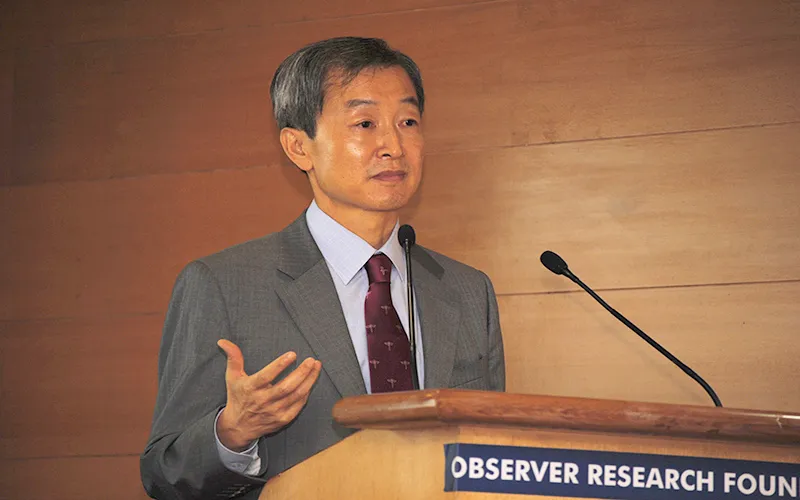-
CENTRES
Progammes & Centres
Location
G-20 is an important forum to ensure world economic stability in a world of changing power dynamics and it is imperative that member states use it so, says First Vice Minister of Foreign Affairs and Trade of the Republic of Korea Ahn Ho-Young.

G-20 is an important forum to ensure world economic stability in a world of changing power dynamics and it is imperative that member states use it so, says First Vice Minister of Foreign Affairs and Trade of the Republic of Korea Ahn Ho-Young.
Delivering a talk on "G-20: Korea’s Perspective" at Observer Research Foundation on June 27, 2012, Vice-Minister Ho-Young explained that in today’s world, with the rise of emerging economies and the inability of the current international institutions to deliver, Korea sees the G-20 as an important forum to ensure that international public goods, such as international economic stability, are ensured. Vice Minister Ho-Young further elaborated that South Korea, with an open economy that depends almost 100% on international trade, highly values international stability and has been working since 2008 to first create and then strengthen the G-20.
The Vice Minister, who has also served as both the G-20 sherpa as well as the G-20 Outreach Ambassador for the Republic of Korea, explained that the Korean government had proposed five main areas that they wanted G-20 leaders to work towards improving in 2008 itself. These areas include the strengthening of the architectural framework of the international finance sector, increased macro-economic coordination and cooperation between member states so as to lessen the impact of the 2008 global financial crisis, increased liquidity and removal of foreign-exchange bottlenecks that might dampen the vitality of emerging economies, increased voice for emerging economies in international financial institutions such as the world bank, and lastly a coordinated effort to reduce and limit protectionist tendencies. All these areas were addressed by the first meeting of the G-20, except the issue of foreign exchange liquidity, which was addressed at the second meeting of the G-20 at London. Vice Minister Ho-Young also credited the London meeting with building up the required mechanisms to ensure the implementation of the G-20’s decisions, even if greater coordination from member states would have been helpful.
The Vice Minister mentioned two favourable announcements that took place at the Pittsburgh meeting of the G-20. President Obama not only called on the G-20 to be a premier forum for economic discussion and decisions, thus ensuring the G-20 achieved the permanence the Korean’s had been hoping for it, but also that Korea was to be the host of the G-20 forum after Canada. Korea was the first non-Anglo Saxon country to host the forum, and the Vice Minister informed the audience that the Republic of Korea decided to use this occasion to expand the ambit of the forum to include issues of international development. This led to the creation of the positively received Seoul Development Agenda, which Prime Minister Zenawi of Ethiopia has lauded as not just being the Seoul Development Agenda but as Africa’s agenda as well.
Vice Minister Ho-Young concluded his talk by stressing that the G-20 can play a unique role in providing the essential "international public goods," especially in the context of the changing international system. He ended by quoting Mr. Peter Drucker, saying that for the G-20 member states, "the best way to prepare for the future is to create it."
A vibrant discussion followed Vice Minister Ho-Young’s talk, with issues relating to the China-Japan-Korea relations, the role of the BRICS (Brazil, India, China, Russia and South Africa) within the G-20, the US- China relationship and the future of the India-Korea relationship being discussed. Vice Minister Ho-Young shared an equation, "Culture - Ideology + Economics," to explain Northeast Asian relations.
He also reminded the audience that China is Korea’s largest trade partner, and informed them that China, Japan and Korea are working to improve coordination and relations amongst themselves. The discussion on BRICS revolved around whether the group had common values and goals, with a view that the disparate treatment of the values of liberal democracy and human rights in the BRICS member states might impede unity within the group.
Vice Minister Ho-Young touched upon India’s liberal democratic tradition and its dedication to upholding human rights as values that it shares with Korea, even if the shared Northeast Asian Confucian bond which ties together China, Japan and Korea does not exist in India’s case.
The Vice Minister also stressed the need for all concerned nations, including the Republic of Korea, to work with the America and China to ensure that a cooperative rather than confrontational relationship between China and the US is nurtured and maintained.
(This report is prepared by Shoumik Bhattacharya, Research Intern, Observer Research Foundation)
The views expressed above belong to the author(s). ORF research and analyses now available on Telegram! Click here to access our curated content — blogs, longforms and interviews.